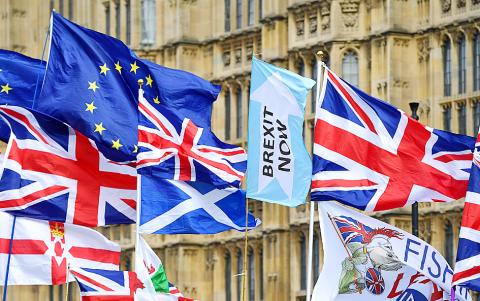The EU yesterday agreed to delay Brexit until Jan. 31 — just three days before the UK was due to become the first country ever to leave the 28-nation bloc.
After a very short meeting of diplomats in Brussels, European Council President Donald Tusk said on Twitter that the EU’s 27 other countries would accept “the UK’s request for a Brexit flextension until 31 January, 2020.”
Tusk said the decision was expected to be formalized through a written procedure, meaning a special summit of EU leaders would likely not be necessary to approve the move.

Photo: EPA-EFE
Two diplomats said the term “flextension” means that the UK would be able to leave even earlier than Jan. 31 if the Brexit divorce deal that the EU and British Prime Minister Boris Johnson agreed upon this month is ratified before Jan. 31.
If that ha0ppens, the UK would leave the EU on the first day of the month following the ratification.
Speaking anonymously because details of the decision have yet to be made public, one diplomat added that the Brexit withdrawal agreement cannot be renegotiated during the extension period.
Johnson did not immediately comment on Tusk’s announcement, but under a law passed by British parliamentarians that forced him to request the extension that he did not want, Johnson must notify Tusk that Britain agrees to the proposed delay.
Johnson had previously said he would “rather be dead in a ditch” than agree to extend Brexit beyond Oct. 31.
He has been hammering his “Get Brexit Done” mantra since he replaced Theresa May this summer, and his apparent willingness to consider leaving the bloc without a Brexit deal has spooked many British lawmakers.
Economists say a no-deal Brexit would hurt the economies of both Britain and the EU.
Tusk’s announcement came after the EU diplomats met to sign off on the Brexit new delay.
Leaving the envoys, European Commission Chief Negotiator for Brexit Michel Barnier told reporters: “It was a very short and efficient and constructive meeting and I am happy the decision has been taken.”
It is the second time the Brexit deadline has been changed since British voters in 2016 referendum decided to leave the bloc.
In London later yesterday, British politicians were to vote on whether to hold an early election to try to break the country’s deadlock over Brexit. Johnson wants a Dec. 12 election, but looks unlikely to get the required support from two-thirds of lawmakers.
In a tactical chess move, the Liberal Democrats and the Scottish National Party plan to push for a Dec. 9 election if Johnson’s proposal fails.
The Conservative Party desperately wants a new election to bolster its numbers in parliament, but they face resistance from the main opposition Labour Party, which fears the country would be unwittingly tricked into crashing out of the EU without a deal.
The Dec. 9 proposal is an effort to force Johnson to delay debate in parliament on his Brexit withdrawal bill until after any election, depriving him of a possible victory on his trademark issue.
It makes Johnson’s government choose between holding an election to improve its position in parliament and its goal of securing Brexit before that election takes place.

The CIA has a message for Chinese government officials worried about their place in Chinese President Xi Jinping’s (習近平) government: Come work with us. The agency released two Mandarin-language videos on social media on Thursday inviting disgruntled officials to contact the CIA. The recruitment videos posted on YouTube and X racked up more than 5 million views combined in their first day. The outreach comes as CIA Director John Ratcliffe has vowed to boost the agency’s use of intelligence from human sources and its focus on China, which has recently targeted US officials with its own espionage operations. The videos are “aimed at

STEADFAST FRIEND: The bills encourage increased Taiwan-US engagement and address China’s distortion of UN Resolution 2758 to isolate Taiwan internationally The Presidential Office yesterday thanked the US House of Representatives for unanimously passing two Taiwan-related bills highlighting its solid support for Taiwan’s democracy and global participation, and for deepening bilateral relations. One of the bills, the Taiwan Assurance Implementation Act, requires the US Department of State to periodically review its guidelines for engagement with Taiwan, and report to the US Congress on the guidelines and plans to lift self-imposed limitations on US-Taiwan engagement. The other bill is the Taiwan International Solidarity Act, which clarifies that UN Resolution 2758 does not address the issue of the representation of Taiwan or its people in

US Indo-Pacific Commander Admiral Samuel Paparo on Friday expressed concern over the rate at which China is diversifying its military exercises, the Financial Times (FT) reported on Saturday. “The rates of change on the depth and breadth of their exercises is the one non-linear effect that I’ve seen in the last year that wakes me up at night or keeps me up at night,” Paparo was quoted by FT as saying while attending the annual Sedona Forum at the McCain Institute in Arizona. Paparo also expressed concern over the speed with which China was expanding its military. While the US

SHIFT: Taiwan’s better-than-expected first-quarter GDP and signs of weakness in the US have driven global capital back to emerging markets, the central bank head said The central bank yesterday blamed market speculation for the steep rise in the local currency, and urged exporters and financial institutions to stay calm and stop panic sell-offs to avoid hurting their own profitability. The nation’s top monetary policymaker said that it would step in, if necessary, to maintain order and stability in the foreign exchange market. The remarks came as the NT dollar yesterday closed up NT$0.919 to NT$30.145 against the US dollar in Taipei trading, after rising as high as NT$29.59 in intraday trading. The local currency has surged 5.85 percent against the greenback over the past two sessions, central